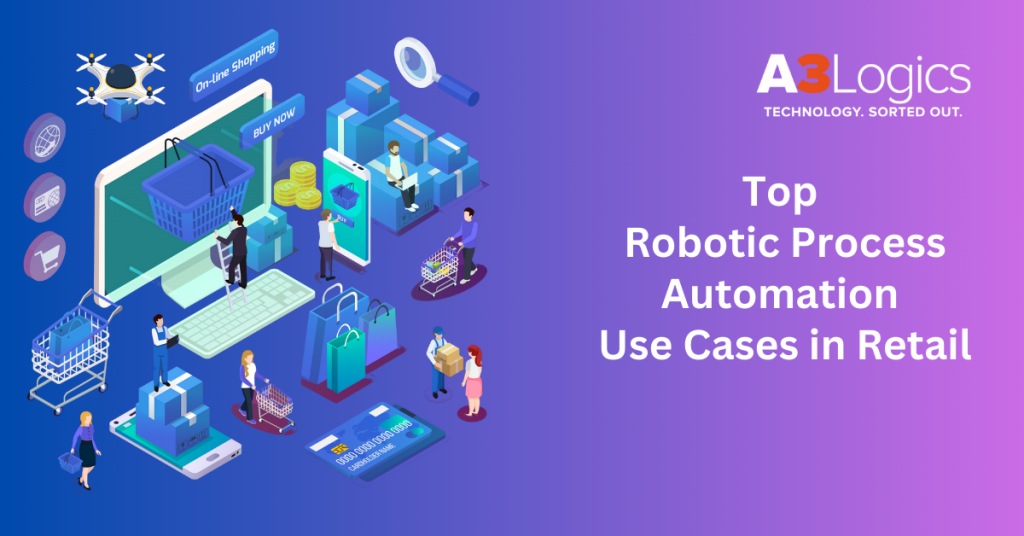Are you thinking about investing in RPA or robotic process automation that can help your retail business soar? You have certainly landed on the right page as we are here to help you understand how RPA solutions can completely transform your business activities and assist you to progress ahead in the respective market. Implementing RPA can certainly play a key role in enhancing efficiency and reducing errors that can pave the way for quality deliveries in the retail market. This is why the demand for RPA development solutions is getting higher with every single day and if you are thinking about how it is going to benefit your retail business, then below we have the answer to all the concerns related to it. Read on as we discuss in detail about all the aspects related to RPA in retail that can help you in the process of decision making.

Table of Contents
Overview of RPA in Retail Industry
RPA in retail is the use of software robots to automate repetitive activities usually needing human involvement. In an industry marked by great transaction volumes and repetitive operations, this technology is very useful. To simplify operations, cut costs, and improve customer happiness, retailers are using RPA more and more.
Historically, the retail sector depended on hand procedures, which may cause mistakes and inefficiencies. RPA’s arrival allows companies to automate customer assistance, inventory control, and order processing among other activities. RPA service scalability lets retailers quickly adjust to shifting market needs, hence guaranteeing their competitiveness.
Important figures highlight RPA’s relevance in retail. A recent poll found that 80% of merchants expect AI and smart automation to become mainstream technologies over the next five years. Furthermore, RPA is thought to help retail companies generate more income by 10%. About 60% of important consumer and retail operations are also automatable, hence underlining the great possibilities for efficiency improvements.
Order fulfillment, customer service improvement, and inventory control are among the RPA use cases in the retail sector. Automating these procedures helps businesses not only save time and money but also increase operational accuracy and speed. Businesses have to be ahead of the curve to use robotic process automation in retail to its greatest potential as it develops.
Key Statistics for the RPA in Retail Industry
The retail sector is undergoing a significant transformation driven by technology and consumer behavior. Here are some key statistics that highlight the importance of RPA in retail:
- E-commerce sales increased by over 27% from 2019 to 2020, demonstrating a shift towards online shopping. This trend emphasizes the need for retailers to automate processes to keep pace with demand.
- By 2023, online sales are expected to account for approximately 25% of the overall retail industry. This shift necessitates efficient operational processes that RPA can provide.
- Implementing RPA can lead to cost reductions of up to 30% in operational expenses, allowing retailers to allocate resources more effectively and invest in growth initiatives.
- Retailers using RPA can process transactions up to 50% faster compared to traditional methods, enhancing customer satisfaction and loyalty.
- RPA can reduce human errors in repetitive tasks by up to 80%, leading to more accurate data processing and improved compliance.
These statistics illustrate the undeniable impact of RPA on the retail industry, underscoring why businesses must adopt this technology to thrive in a competitive landscape.
Need for RPA in Retail
The retail sector faces numerous challenges, including rising operational costs, increasing consumer expectations, and the need for real-time data accessibility. As a result, there is an urgent need for robotic process automation in retail to address these issues effectively.
1. Efficiency and Cost Savings
Retailers are constantly seeking ways to reduce costs while improving efficiency. RPA can automate time-consuming tasks such as data entry, inventory management, and order processing. By streamlining these processes, businesses can cut operational costs and allocate resources to higher-value activities.
2. Enhanced Customer Experience
In today’s fast-paced retail environment, customers expect prompt and personalized service. RPA services enable retailers to respond quickly to customer inquiries and automate communication channels. This leads to improved customer satisfaction and loyalty, as consumers appreciate timely and accurate responses.
3. Scalability
As retail businesses grow, so do their operational complexities. RPA allows for scalable solutions that can handle increased transaction volumes without compromising quality. Retailers can easily adjust their automation strategies to meet changing demands, ensuring they remain competitive.
4. Data-Driven Decision Making
With RPA, retailers can collect and analyze vast amounts of data more efficiently. This capability allows businesses to gain insights into consumer behavior, inventory management, and market trends. Data-driven decision-making enhances strategic planning and helps retailers stay ahead of the competition.
5. Competitive Advantage
In a crowded marketplace, having a competitive edge is crucial. Retailers that adopt RPA can differentiate themselves by improving operational efficiency, enhancing customer service, and reducing costs. This technological advantage can lead to increased market share and profitability.
Top Use Cases of RPA in Retail
Robotic process automation in retail offers a plethora of use cases that can significantly enhance operational efficiency and customer satisfaction. Here are some of the top use cases of RPA in retail:
> Order Processing and Fulfillment
Order processing is a critical function in retail, often fraught with manual errors and delays. RPA streamlines this process by automating data entry, inventory checks, and order confirmations. By utilizing RPA services, retailers can ensure faster order fulfillment and higher accuracy, leading to improved customer satisfaction.
> Customer Support
Providing exceptional customer support is essential for retail success. RPA can automate responses to common customer inquiries, manage chatbots, and handle ticketing systems. This automation allows human agents to focus on more complex issues, enhancing the overall customer experience and reducing resolution times.
> Ensuring Proper Management of Refunds and Returns
Managing refunds and returns can be a labor-intensive process for retailers. RPA automates the entire workflow, from initiating returns to processing refunds. By eliminating manual intervention, RPA reduces errors and accelerates the return process, ultimately improving customer satisfaction.
> Regulatory Reporting & Compliance
Retailers are required to adhere to various regulations, which often involve extensive reporting. RPA simplifies compliance by automating data collection and report generation. This not only ensures accuracy but also saves time, allowing retailers to focus on core business activities instead of regulatory burdens.
> Fraud Prevention and Detection
Fraud is a significant concern in the retail industry, costing businesses millions annually. RPA can monitor transactions in real-time, flagging suspicious activities for further investigation. By implementing RPA for fraud detection, retailers can protect their assets and maintain customer trust.
> Marketing Automation
RPA services can enhance marketing efforts by automating campaign management, customer segmentation, and performance analysis. Retailers can use RPA to streamline marketing processes, ensuring timely and targeted outreach to consumers, which ultimately drives sales and brand loyalty.
> Monitoring Competitive Prices Using RPA Bots
In a competitive retail landscape, staying informed about competitors’ pricing strategies is crucial. RPA bots can automatically scrape competitor websites for pricing information, allowing retailers to adjust their pricing strategies accordingly. This proactive approach helps maintain competitiveness and optimize profit margins.
Benefits of RPA in Retail
The adoption of RPA in retail comes with numerous benefits that can transform operations and enhance customer experiences.
1. Increased Efficiency
RPA automates repetitive tasks, freeing employees to focus on higher-value activities. This increased efficiency leads to faster processing times and improved overall productivity, allowing retailers to better serve their customers.
2. Cost Reduction
By automating manual processes, retailers can significantly reduce operational costs. RPA minimizes the need for extensive workforce management and lowers the risk of human errors, resulting in substantial cost savings.
3. Enhanced Accuracy
RPA ensures high levels of accuracy in data processing and task execution. Reducing human intervention minimizes errors, leading to more reliable outcomes and better compliance with regulations.
4. Improved Customer Experience
With RPA handling routine inquiries and processes, retailers can enhance the customer experience by providing faster and more accurate responses. This leads to increased customer satisfaction and loyalty.
5. Scalability
RPA solutions are easily scalable, allowing retailers to adapt to changes in demand without significant investments in additional resources. This flexibility is crucial for businesses looking to grow and remain competitive.
Challenges of Implementing RPA in Retail
While RPA offers significant advantages, its implementation in the retail industry is not without challenges.
i. Change Management
Introducing RPA requires a cultural shift within organizations. Employees may resist changes to established processes, necessitating effective change management strategies to ensure smooth adoption.
ii. Integration with Existing Systems
Integrating RPA with legacy systems can pose challenges, as older technologies may not be compatible with modern automation solutions. Retailers must assess their existing infrastructure and plan for necessary upgrades.
iii. Data Security Concerns
As RPA involves handling sensitive customer data, retailers must prioritize data security. Implementing robust security measures is essential to prevent data breaches and maintain customer trust.
iv. Initial Investment
The initial investment required for RPA implementation can be significant, especially for small to medium-sized businesses. Retailers must carefully evaluate the long-term benefits against the upfront costs.
v. Skill Gaps
Successful RPA implementation requires skilled personnel who understand both automation technology and retail processes. Retailers may need to invest in training or hire new talent to bridge these skill gaps.
Real-Life Examples of Using RPA in Retail
Several retailers have successfully implemented RPA to enhance their operations and customer experiences.
E. & J. Gallo
E. & J. Gallo, a prominent winery, utilized RPA to automate data transfers to its inventory management system. This not only improved efficiency but also led to the discovery of new RPA applications throughout the organization.
Coke Canada Bottling
Coke Canada Bottling leveraged RPA to empower its employees by automating various processes. This initiative saved thousands of hours and reduced reliance on IT, enabling the company to focus on strategic initiatives.
Foodstuffs
Foodstuffs, a New Zealand-based FMCG cooperative, scaled its RPA efforts to automate simple processes, resulting in significant benefits for employees. This initiative eliminated the need for weekend work and improved overall job satisfaction.
John Lewis
John Lewis implemented RPA for fraud detection, running 20,000 forensic checks in just one week. This automated approach not only saved time but also allowed employees to concentrate on more strategic projects.
Utilita
Utilita, an energy company, utilized RPA to enhance customer service by automating responses to customer requests. This approach improved response times and allowed agents to focus on providing personalized service.
Future Trends of RPA in Retail
The future of RPA in retail is poised for significant advancements as technology continues to evolve.
> Integration with AI
The integration of RPA with artificial intelligence is set to enhance automation capabilities. AI-powered RPA bots will enable retailers to analyze data more effectively and make smarter decisions.
> Increased Adoption of No-Code Solutions
No-code automation platforms will empower non-technical staff to create and manage automation workflows. This democratization of automation will accelerate RPA adoption across retail organizations.
> Focus on Customer-Centric Automation
Retailers will more and more concentrate on automating procedures improving the consumer experience as customer expectations keep growing. This covers effective order control, simplified service, and tailored marketing.
> Expansion into New Areas
RPA’s reach will go beyond conventional duties as retailers look into automated possibilities in areas including supply chain efficiency, demand forecasting, and even physical store operations.
> Continuous Improvement and Innovation
Retailers will give continuous assessment and enhancement of their RPA projects top priority. This will include using data analysis to hone automation plans and make sure they fit changing corporate objectives.
Final Thoughts
Hopefully you are clear about how Robotic Process Automation in retail can be a game changer and help you get ahead of your competitors. It is important that you get it done at the quickest as it helps you enhance your customer experiences and serve them error-free. It paves the way to curb any kind of frauds and ensure that the operations are running seamlessly. If you are looking for assistance in terms of implementation of automation, then you must not hesitate and consider connecting with the professionals at A3Logics and get all the assistance you need.








